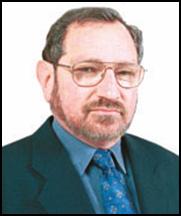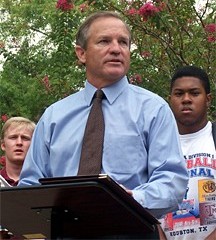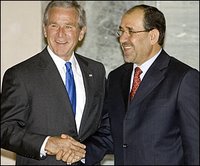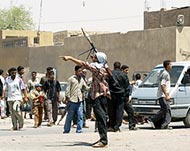There is information to be had about the real situation in Iraq. Unfortunately, facts only get in the way of our Decider's decision-making
>
"[Congressman Edwards] believes that 'younger soldiers, both commissioned and non-commissioned,' can often provide more candid testimony than higher-ups constrained in their ability to present 'bad news.'"
--E. J. Dionne Jr., in his Washington Post column today, "Wisdom From Down the Chain of Command"
I really don't think that American policy in Iraq should be set by referendum. At the same time, obviously, any policy we follow has to have a minimum amount of public support, meaning that the policy-maker(s) must make a believable case to the American public.
So I do try to pay attention to what people who actually know something about the situation in Iraq have to say. I don't make a fetish of it, since (a) it really is horrifically complicated, (b) it's not the least bit entertaining, (c) in the grand scheme of things it doesn't matter whether I understand it or not, and (d) understanding, even when I achieve a modicum of it, usually doesn't make me feel better or more confident anyway.
 For example, as I mentioned the other day, after reading the intelligence report by George Friedman (right, founder of the Stratfor, or Strategic Forecasting, "private intelligence company") detailing the background to the "military surge" option the president was expected to announce, I understood all sorts of things I didn't understand before--and had no better clue what the heck we could/should do.
For example, as I mentioned the other day, after reading the intelligence report by George Friedman (right, founder of the Stratfor, or Strategic Forecasting, "private intelligence company") detailing the background to the "military surge" option the president was expected to announce, I understood all sorts of things I didn't understand before--and had no better clue what the heck we could/should do.Still, it bothers me that so little discussion of "what to do in Iraq" discusses it in terms of what's actually going on there. I worry even more, though, that as little as I know about the realities "on the ground," I still seem to know way more than the president and his advisers. Of course they are supposed to have access to all sorts of information that we common folk don't, but every time we get access to actual information, it suggests that everything the administration claims to know is entirely fabricated--and fabricated by people who are both totally misinformed and clinically insane.
 If, for example, Chimpy the Prez actually believes a single word of his characterization of the "sides" in Iraq in his big speech the other night--either his fantasy of "our" side or his complete misperception of the "enemy" side--then THERE IS NO OTHER COURSE THAT CAN POSSIBLY BE CONISDERED EXCEPT TO HAVE HIM REMOVED IMMEDIATELY TO A MAXIMUM-SECURITY FACILITY FOR THE CRIMINALLY INSANE AND KEPT UNDER 24-HOUR GUARD to make sure that he cannot have any influence on any aspect of public policy while his mental derangement continues.
If, for example, Chimpy the Prez actually believes a single word of his characterization of the "sides" in Iraq in his big speech the other night--either his fantasy of "our" side or his complete misperception of the "enemy" side--then THERE IS NO OTHER COURSE THAT CAN POSSIBLY BE CONISDERED EXCEPT TO HAVE HIM REMOVED IMMEDIATELY TO A MAXIMUM-SECURITY FACILITY FOR THE CRIMINALLY INSANE AND KEPT UNDER 24-HOUR GUARD to make sure that he cannot have any influence on any aspect of public policy while his mental derangement continues.This isn't a matter of agreeing or disagreeing with a policy, but of sequestering a dangerous lunatic. Unfortunately, the only legal mechanism we have to deal with the situation, the 25th Amendment, provides only one remedy: that "the Vice President and a majority of either the principal offices of the executive departments or of such other body as Congress may by law provide, transmit to the President pro tempore of the Senate and the Speaker of the House of Representatives their written declaration that the President is unable to discharge the powers and duties of his office."
 And what happens then? "The Vice President shall immediately assume the powers and duties of the office as Acting President."
And what happens then? "The Vice President shall immediately assume the powers and duties of the office as Acting President."Out of the frying pan, into the nuclear holocaust. Our vice president is already "acting president," and he's orders of magnitude battier than the nominal president.
Hmm, I set out to make a point. Oh yes, about plausible information about the reality in Iraq. The other day Harold Meyerson devoted a terrific column to the fraud the president was perpetrating on us by pretending that the Maliki government in Iraq could be thought of as an honest broker among the country's political factions, when it operates--in more or less identical faction to the president's own political strategy--as both a tool and an exploiter of the country's most extreme and violent factions.
 Today Meyerson's fellow Washington Post columnist E. J. Dionne Jr. presents portions of a remarkable document shared with him, with the author's permission, by Rep. Chet Edwards (left), "a middle-of-the-road Texas Democrat" who chairs the subcommittee of the House Appropriations Committee that deals with military construction and veterans affairs. The document is "a powerfully honest, thoughtful and sophisticated 3,800-word memo" based on the experiences in Iraq of an Army officer who "accepts the goals of the war and writes not a critical word about the president."
Today Meyerson's fellow Washington Post columnist E. J. Dionne Jr. presents portions of a remarkable document shared with him, with the author's permission, by Rep. Chet Edwards (left), "a middle-of-the-road Texas Democrat" who chairs the subcommittee of the House Appropriations Committee that deals with military construction and veterans affairs. The document is "a powerfully honest, thoughtful and sophisticated 3,800-word memo" based on the experiences in Iraq of an Army officer who "accepts the goals of the war and writes not a critical word about the president."For this officer, winning entails getting the politics right in Iraq at both the local and national levels. Locally, he says, our military has enjoyed considerable success. But he's worried about the will and capacity of Iraqi Prime Minister Nouri al-Maliki to take on the Shiite militias.
"Our real goal," he wrote, "was to persuade our Iraqi friends and allies to actively and publicly support us . . . to help us tip the balance of public opinion in our favor." That meant helping them with security and "civil works projects" and giving them "prestige by showing publicly that our commander listened to their advice."
Then these shrewd words: "We discovered that we were not fighting a military campaign, but a political campaign--not too different from what a small town mayor might do to win reelection back in the U.S. . . . Fighting terrorists was only something we did when needed, because it interfered with our political objectives. If we could ignore the terrorists, we were winning. If we had to stop our economic and political activities in order to fight terrorists, they were winning."
The core problem, the officer said, lay in the unwillingness of Shiites in the Iraqi security forces to confront their own side. "Most officers did a great job when facing Sunni-based insurgents," he wrote. "In fact, we had to keep a close eye on most units to make sure they were not too heavy-handed against the Sunnis."On the other hand: "When we dealt with the Shia, especially the Mahdi militia, things got a lot more complicated. Many officers were reluctant to fight the Shia militias because they had a well-justified fear for the security of their family. I have seen senior Iraqi officers flat refuse to follow American soldiers in pursuit of Shia insurgents--even when those insurgents just killed their own soldiers."
The trouble goes all the way to the top. "We will never reach any kind of acceptable political settlement as long as the Coalition and the Iraqi government allow legitimate political parties to hold seats in the National Assembly while they finance and maintain military auxiliary wings that attack and kill Iraqi and American soldiers. These parties have enough clout in PM Maliki's administration to effectively block any major military operation against the militias. This is an impossible situation.
"I don't have the expertise to comment on whether or not a temporary 'troop surge' is necessary," he said. "I can say, however, that a troop surge is pointless if we cannot set the political conditions beforehand that allow us to act freely against the militia."
Too bad the Decider doesn't know any of these things, which anyone with a functioning brain would consider indispensable to any reasonable decision-making process. I really have no idea what's to be done, except to watch things get messier, knowing as we do that only a tiny portion of the American populace is actually shedding blood in this loony regime's lunacies. The rest of us will pay a price that's confined to the economic, moral, political (international as well as domestic) and social dimensions.





0 Comments:
Post a Comment
<< Home